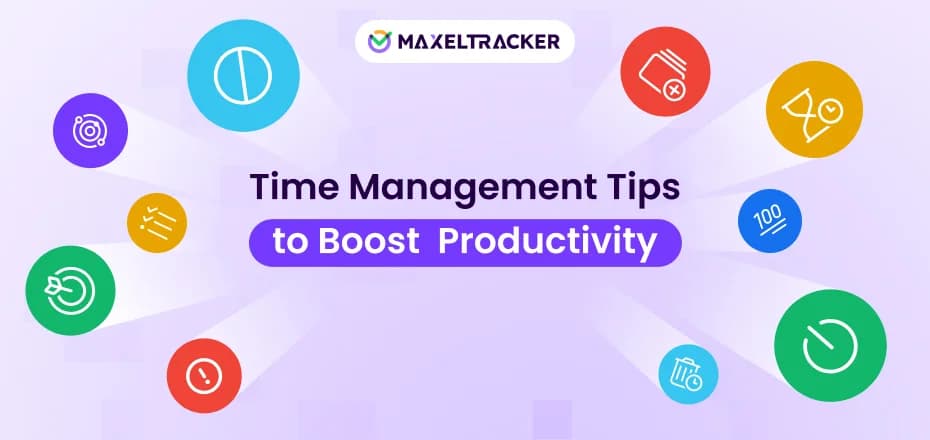

As Benjamin Franklin wisely said, "By failing to prepare, you are preparing to fail."
Many time management mistakes stem from a lack of planning, causing us to dive into our daily tasks without proper preparation.
If you find yourself struggling with time management, you're not alone. In this post, we’ll explore ten common time management mistakes to avoid and provide practical strategies to help you avoid or overcome them.
Before we explore common mistakes and their solutions, it’s important to understand why time management is essential for both individuals and organizations.
Boosts Productivity: Organizing and prioritizing tasks allows you to accomplish more in less time, enhancing overall efficiency.
Enhances Decision-Making: A clear schedule helps you allocate time wisely and make informed choices about your priorities.
Reduces Stress: Poor time management can lead to missed deadlines and overwhelming workloads, while effective planning keeps stress levels in check.
Promotes Work-Life Balance: Managing time well helps create a healthier balance between personal and professional responsibilities, leading to greater fulfillment and satisfaction.
Time management is essential for productivity, yet many people unknowingly make mistakes that hinder their efficiency. Here are some of the most common time management pitfalls and practical solutions to overcome them.
Have you ever forgotten an important task? If you avoid making a to-do list, chances are you’ve experienced this at least once. One of the most common time management mistakes is failing to create or follow a structured task list.
Solution: Plan your daily tasks in advance and always maintain a to-do list. However, simply creating it isn’t enough—you need to follow it consistently to stay organized and productive.
We naturally set priorities in our personal lives, but what about our professional lives? Many business leaders and managers struggle with prioritizing tasks effectively, especially when multiple responsibilities demand equal attention. Without a clear system, it’s easy to become overwhelmed and lose focus.
Solution: Review your to-do list and categorize tasks into two sections: a "Do First" list for high-priority tasks and a "Do Later" list for less urgent ones. This structured approach helps you tackle the most important tasks first while ensuring nothing gets overlooked.
Do you have a clear vision of where you’ll be in the next five years? While no one can predict the future, setting realistic goals provides direction. Without clear, attainable objectives, time management suffers, leading to wasted effort on less meaningful tasks.
Solution: Use the SMART framework to set goals—make them Specific, Measurable, Achievable, Relevant, and Time-bound. This structured approach helps you stay focused, track progress, and work efficiently toward meaningful achievements.
Everyone is busy—but are we busy with meaningful tasks or just caught up in less important activities? There’s a big difference between staying occupied and being truly productive. Spending too much time on secondary tasks can take focus away from achieving key objectives.
Solution: Prioritize your most important tasks. Allocate 80% of your time to high-impact work and reserve the remaining 20% for lower-priority tasks. This ensures that your time is spent effectively on what truly matters.
While aiming for high-quality work is commendable, striving for perfection in every task can be counterproductive. Many people get caught up in refining every detail, which consumes valuable time and leaves important tasks unfinished. Not everything needs to be flawless—sometimes, efficiency matters more than perfection.
Solution: Set clear deadlines for your tasks to stay on track. Focus on delivering top-quality work where it truly matters, but be pragmatic with less critical tasks. Understanding when "good enough" is sufficient will help you maintain productivity without unnecessary delays.
Losing track of time while working can be a major pitfall. It’s easy to get engrossed in a task and spend more time on it than planned, which can disrupt your entire schedule. As a result, you may find yourself rushing through other important tasks or sacrificing personal time to catch up.
Solution: Use a timer or set reminders to monitor how long you spend on each task. Additionally, schedule regular breaks to maintain productivity and prevent burnout. Keeping a structured approach to time management ensures you stay on track without overextending yourself.
Procrastination is the act of delaying tasks that need immediate attention, often because we believe there’s plenty of time left. However, this habit can quickly lead to stress and rushed work. It's one of the most common time management mistakes everyone falls victim to at some point!
Solution: Give yourself a small window to start the task, even if it's just for a few minutes. Once you begin, you'll likely gain momentum. Another helpful strategy is breaking the task into smaller, more manageable milestones, so it doesn’t feel overwhelming and you can focus on one step at a time.
Multitasking has become a common practice in the workplace, with many people trying to juggle multiple tasks at once to save time. However, this often results in lower-quality work. Studies show that multitasking can actually take up to 20% more time than completing tasks one after another.
Solution: Focus on one task at a time and give it your full attention. By doing so, you’ll complete each task more efficiently and without compromising on quality.
In the race to finish tasks, many people skip regular breaks, thinking it's a waste of time. However, neglecting breaks can actually harm productivity and quality in the long run. Your brain needs regular downtime to maintain focus and creativity.
Solution: Take short breaks to refresh your mind and body. Even if you're busy, step away for a moment—whether it's having a coffee, taking a quick walk, or listening to music. A brief pause will recharge you, ultimately boosting your productivity.
It’s easy to fall into the habit of saying “yes” to every opportunity or project that comes your way. However, overcommitting can lead to overwhelm, poor performance, and added stress. Taking on too many responsibilities spreads you thin and reduces your ability to manage your time effectively.
Solution: Be discerning when deciding which projects to take on. Learn to politely decline tasks that don't align with your priorities or when your schedule is already full. Saying “no” helps protect your time and ensures you can focus on what truly matters.
Time is irreplaceable—it’s one of the most precious resources we have. As a business leader, respecting and managing your time effectively is crucial. Avoiding common time management mistakes can help you boost productivity and set yourself up for success. Every minute you save brings you closer to your goals, so take action now. Start applying these solutions today and watch your efficiency soar.
👉 Sign up now at MaxelTracker.com and start transforming your team’s productivity today! 🚀
👉 Explore our pricing plans and features to find the perfect solution for your team’s productivity needs! 🚀
Related Blogs

TeamLogger Alternatives & Competitors
TeamLogger is a great and reliable functional tool for basic time and activity tracking, but many businesses today have realized many more things. This feature alone is not going to cut it.
Monitask Alternatives & Competitors
Today, we are going to discover a more complete way to monitor employee productivity, manage their time, and track team activity. MaxelTracker goes beyond basic time tracking and periodic screenshots.

We360.ai Alternatives & Competitors
It is time to discover a more practical way to monitor employee productivity and manage your teams. MaxelTracker goes beyond analytics dashboards to deliver real-time insights to you.